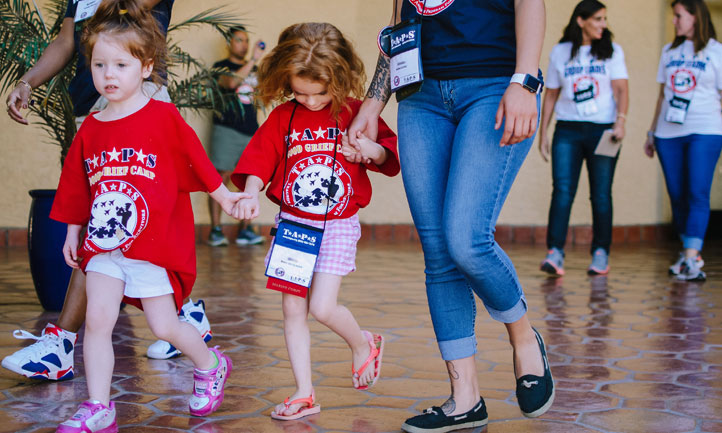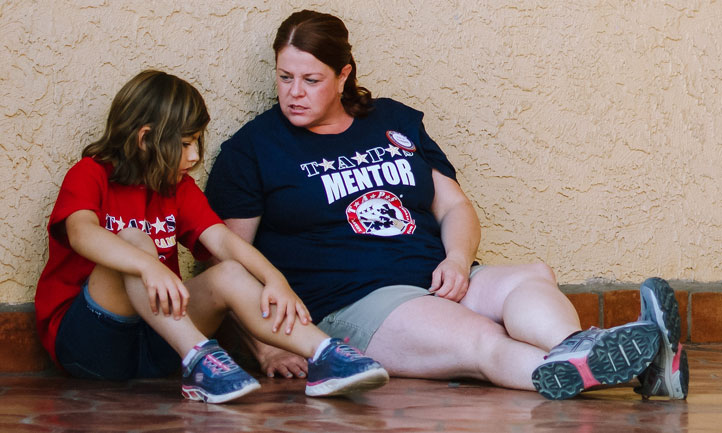Five Reasons to Bring Your Kids to the National Military Survivor Suicide Seminar
Author: Karissa Kelley
Protecting children from harm, guarding their innocence, and providing a happy childhood are paramount goals in the mind of a loving caregiver. Words like “death,” “suicide,” and “grief” may not seem to fit with this vision of a happy childhood. Attending a National Military Suicide Survivor Seminar (NMSSS) is also not what people dream of for their children. At TAPS, we often say you find yourself part of a family where you never wanted to belong but cannot imagine living without. Children need this family too. At the TAPS Good Grief Camp (GGC), children affected by a loved one’s suicide are able to find a safe place where they are among peers, have permission to ask hard questions, learn language to describe their circumstances, build coping skills, and embrace hope for their future.

Reason #1: They are not the only one.
Life as a suicide survivor can be an isolating and lonely road. Children often feel disconnected from peers and stigmatized by society, as many adults do. It’s common for children to feel they are no longer accepted or understood by their friends, classmates, and teammates. It’s very easy for children to begin feeling as though they are the “only one” in the world to be feeling the way they do.
At the Good Grief Camp, each child is placed in a group of peers who are of a similar age. Each group includes up to 25 kids and as many Military Mentors who are each assigned to a specific child. Each group is led by a volunteer mental health clinician and supported by a Group Leader and Senior Mentor. At the National Military Suicide Survivor Seminar, every child has lost a loved one by suicide. Even for children who are unsure whether they want to attend, there is often an almost instant sense of belonging in knowing (sometimes for the first time ever) that they are not the “only one” who has experienced the unfathomable grief that accompanies suicide.
Reason #2: They’ll have permission to ask hard questions.
Suicide is not easy to talk about. Suicide is not an easy word to say. Suicide also usually brings with it any number of unanswerable questions. These questions—like “why?” or “was it my fault?” or “where is my loved one now?”—often plague children just as they do adults. Many questions can never be answered. But TAPS Good Grief Camp Group Leaders and Mentors are trained to listen to your child’s questions and support them in wondering about hard topics even when there are no answers. This helps communicate to children that what they feel is not wrong or weird. Your child may never find the answers we all wish existed, but they will find support, friendship, and a hug.

Reason #3: They’ll learn appropriate vocabulary.
It’s almost impossible to process something you don’t know how to talk about. Children’s grief can feel “stuck” until they learn to name their feelings and experiences. It is of utmost importance for children to be equipped with the proper vocabulary and language as they journey through grief. The Good Grief Camp strives to use correct terminology to assist children’s healing.
Reason #4: They’ll build coping skills.
Good Grief Camp is sometimes mistaken for a place where kids just play and have fun. This is absolutely part of what your kids will do, but it is not the whole picture. Each Group Leader carefully prepares a developmentally appropriate lesson plan for the weekend. TAPS is a peer-based program; we do not provide therapy. But we do create a safe space for children to learn and grow and find support. Using tools like play, art, mindfulness, and movement, children attending the National Military Suicide Survivor Seminar will learn skills for coping with their grief.
Reason #5: They’ll embrace hope for their future.
Children who have been affected by suicide are at a higher risk for experiencing their own mental health struggles. As is the case with many adults, it is often hard for children to find purpose or energy after experiencing a suicide loss. But children may express this differently from the way adults do. They may seem lethargic or disengaged from activities they previously enjoyed. Their behavior may seem unmanageable or erratic. Their grades may suffer. Sometimes children internalize their feelings and it’s difficult to tell they feel depressed. At TAPS, children are not required to talk or share until or unless they feel comfortable. Good Grief Camp programming works to find unique ways of supporting all children in identifying, naming, and finding sources of hope in their lives.
Attending the National Military Suicide Survivor Seminar can be a difficult and scary task for adults and children alike. It is a brave act to walk through the Good Grief Camp doors on day one. For many TAPS kids, the home and the family they find ends up being worth the courage it took to show up. Our hope for all TAPS families is for kids to return home after the National Military Suicide Survivor Seminar feeling thankful they came and eagerly looking forward to their next Good Grief Camp experience. Learn more about the National Military Suicide Survivor Seminar that will be held in Palm Harbor, Florida, October 5-8, 2018.
From the pen of...
Karissa Kelley, LPC, CT is the TAPS Youth Programs Manager and the suicide surviving sister of Airman 1st Class Caleb Kelley.
